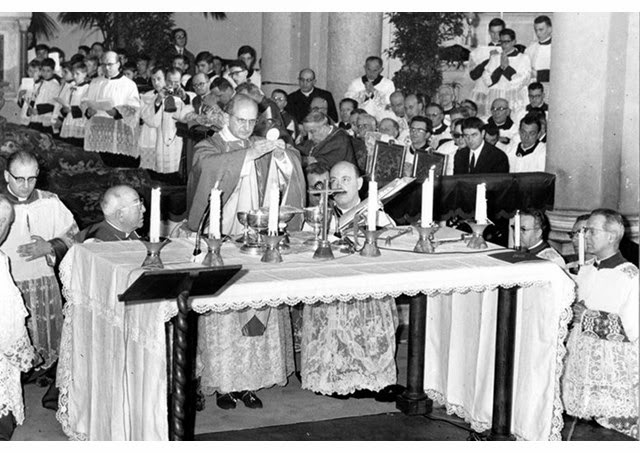
7. mars feiret pave Paul VI det som regnes som første messe på morsmålet (selv om jeg tro en del ting fortsatt var på latin, som Canon). Vi leser om dette på NLM-bloggen:
On March 7, 1965, Blessed Paul VI…celebrated the first Mass in Italian in history in the parish of Ognissanti (All Saints), Rome,” Vatican Information Services tells us. … This anniversary, and the celebration of it, may seem a little anomalous—after all, the ‘new’ Mass came into force on the first Sunday of Advent in 1969. Why the celebrations now?
March 7th, 1965, was in fact the date on which the Instruction Inter Oecumenici “On the Proper Implementation of the Constitution on the Sacred Liturgy,” dated September 26, 1964, came into force. It was the first significant implementation of the liturgical reform. Hence Paul VI’s words at the beginning of his homily at Oggnisanti: “Today we inaugurate the new form of liturgy in all the parishes and churches of the world.” …
… Let us return to the church of Ognissanti on the Via Appia Nuova in Rome’s Appio-Latino quarter, and “the first Mass in Italian in history” celebrated by Paul VI (well, given the canon &c., mostly in Italian). To arrive at an extensive use of the vernacular merely 459 days after the promulgation of the Constitution on the Sacred Liturgy on December 4, 1963, was quite an accomplishment—a direct fruit of the requests submitted by the Italian bishops to the Consilium and of the prompt and positive responses it increasingly gave to such requests.
The leadership of the Consilium and, seemingly, most Italian bishops, regarded the maximum use of the vernacular as being of great importance, if not as indispensable, in achieving a participatory and truly pastoral liturgy. “The fundamental norm from today and in the future is to pray understanding every phrase and word, to complete [them] with our personal feelings, and to make them one with the soul of the community that sings with us in unison,” Paul VI said in his homily.
Indeed, reading the memoirs of the Consilium’s Secretary, Annibale Bugnini CM, it becomes clear that the question of arriving at a liturgy that was completely in the vernacular was a burning quest which left the clearly nuanced provisions of the Constitution on the Sacred Liturgy far behind (“In Masses which are celebrated with the people, a suitable place may be allotted to their mother tongue” § 54; see also § 36). Bugnini himself had to admit that “it cannot be denied that the principle, approved by the Council, of using the vernaculars was given a broad interpretation.” Indeed, he held—somewhat arrogantly—that since its introduction “millions and hundreds of millions of the faithful…have at last achieved worship in spirit and truth” and “can at last pray to God in their own languages and not in meaningless sounds.” Paul VI himself asserted that March 7th, 1965, was “a great event, that shall be remembered as the beginning of a flourishing spiritual life, as a new effort to participate in the great dialogue between God and man.” …..
